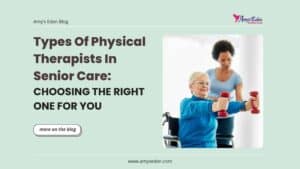
8 Memory Care Requirements That You Need to Consider Before Committing Your Loved One
Have you noticed a decline in cognitive and memory abilities as your loved one ages? In some individuals, this decline can be more pronounced, resulting

As our loved ones get older and require additional support from family members or professional caregivers, embarking on a search for the ideal type of senior care can be a daunting task with numerous considerations ranging from health care quality to financial implications. One of the most common care options for the elderly is nursing home care.
While it promises round-the-clock support and specialized medical attention, the decision to place a cherished loved one there may not be an easy one to make.
In the article, we take in deep dive into everything you should know about nursing home care, how it differs from in-home nursing, if it’s the ideal senior care option for your loved one, and how you can find the best fit.
Let’s get started.
Nursing home care is a type of senior care service provided in nursing homes.
So, what is a nursing home?
A nursing home for elderly individuals provides round-the-clock medical assistance and personal care for older adults outside of a hospital and the home. Nursing home residents typically have severe or chronic illnesses, disabilities, or cognitive impairments. They may also be recovering from injuries/short-term medical conditions that prevent them from living safely at home.
Registered nurses and nurse aides are usually on-site to supervise and provide personalized care to residents 24 hours a day. Other healthcare providers such as occupational, physical, and speech therapists are also available to provide specialized care as needed.
Nursing homes are regulated by federal and state governments where they operate, as they typically receive Medicare and Medicaid funding.

Nursing homes provide skilled medical care services including
Skilled medical care includes:
There are various reasons why your loved one may need nursing home care. They include:

There are numerous benefits of senior nursing home services. These include:
In-home nursing care is provided in the convenience of your loved one’s home. It is offered to older adults discharged from the hospital, but still requires a nurse to provide therapeutic and rehabilitative services at home.
A home health nurse will work together with your loved one’s doctor to provide a personalized care plan. Care can be short-term, long-term, based on schedule, or just a few hours every day.
While in-home nursing and nursing home care are similar, the major difference is that not all types of nursing care can be provided at home. For instance, care that requires the use of specialized medical equipment that is not readily available at home.

Whether your loved one will be staying short-term or long-term in a nursing home, finding one that offers above-average service and feels like home can make all the difference. Since it may take some time to find the right home, planning in advance is essential.
With lots of choices available, a good place to start your search will be the nursing home compare tool provided by the Centers for Medicare and Medicaid Services (CMS).
This tool provides a plethora of data and content designed to guide individuals through this critical decision-making process and allows you to compare different nursing homes based on certain criteria such as:
In light of the COVID-19 pandemic, the website also provides up-to-date news and resources, assisting nursing homes in staying informed about the latest health guidelines and safety protocols.
With this tool, you can narrow down your options quickly, then call the nursing homes for more inquiries and visitation.
Learn more about how to use the nursing home compare tool.
Before you call a nursing home, identify what your loved one’s needs and preferences are, and what services they might need. This will help you gauge if the services provided by a nursing home will be appropriate for your loved one.
During your call or visitation be sure to find out about the following:
While no nursing home is perfect, the right nursing home will check off most considerations you have.

There are a couple of ways to pay for nursing home care. Fortunately, some government programs can assist.
This is a federal government health insurance program for older adults 65 and above without regard to income. Medicare will only cover care in a nursing home that is licensed by Medicare. It covers only 100 days of nursing care upon referral by a doctor after discharge from a hospital stay of at least 3 days.
If your loved one needs custodial care or support with daily activities alone, Medicare will not cover it.
This is a joint federal and state health insurance program providing coverage to low-income elderly individuals who meet some eligibility criteria. Eligibility criteria vary from state to state. Be sure to reach out to your state’s office to find out those criteria, and the extent of coverage provided.
If your loved one has private long-term care insurance, this can be used to fund nursing home care. Reach out to the insurance provider to determine eligibility requirements, restrictions, and what is covered.
Nursing home care is ideal for your elderly loved one if they need medical care that doesn’t need to be provided in the hospital or at home. This could either be as a result of discharge from a hospital or chronic conditions requiring around-the-clock assistance.
The nursing home compare tool helps you identify and compare nursing homes near you quickly. However, this tool won’t tell the whole story. Be sure to call the nursing home, ask questions, and request a visit.
Factors such as admission requirements, licensing and staffing, cost, and condition of the facility should be considered when deciding on nursing home care. Move forward with a nursing home that checks off these considerations and provides above-average care.
Want a more personalized type of nursing care, Amy’s Eden specialized care services can be counted upon. We offer dementia care, post-operative care, diabetes management, chronic condition management, End of life care, and more. Contact us today to learn more about how we provide compassionate care for your elderly loved one.
Get care >

Have you noticed a decline in cognitive and memory abilities as your loved one ages? In some individuals, this decline can be more pronounced, resulting

When we think about healthcare for seniors, we might not think of sports therapists. They usually work with athletes and help them stay fit. However,

Are you considering physical therapy as a career option? Sometimes, you may or may not know what to expect once you become a certified physical

Do you find it harder to move around like you used to? Is chronic pain affecting your daily activities and overall quality of life? Do

Amy's Eden Senior Care © 2023